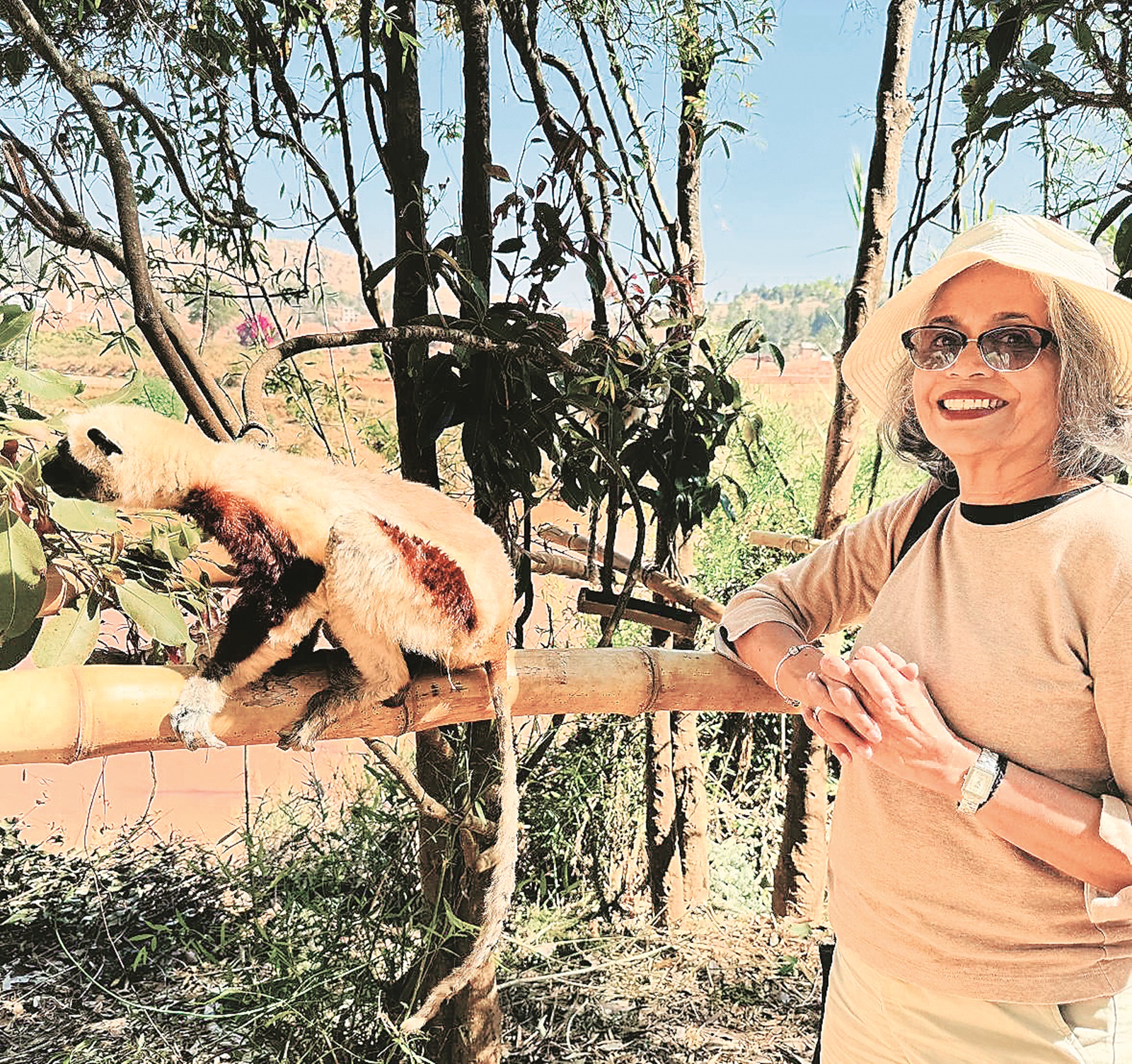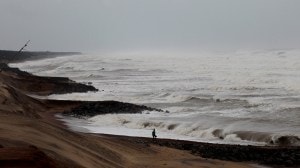From Bilaspur to Agatha Christie’s hotel in Egypt: How India’s women travellers are pushing limits with adventure
Women from small town India are making the journey of a thousand miles with that first step — from travelling solo to going on adventure treks — and in the process finding their me-time
 Women on a camping trip in Uttarakhand (Credit Shireen Mehra)
Women on a camping trip in Uttarakhand (Credit Shireen Mehra)Five years ago, Neha Mewada turned 40 and did what she had never dreamt of doing — hit the road solo. Feeding off travel vlogs on her smartphone, the software professional from Ajmer, who was then posted at Mysuru, rode her Activa and decided to stop at any destination within a 100-km radius. “That got me to Chunchi Falls in about five hours. I captured a 360-degree view of the rocky terrain sheathed in green, the water frothing up below. The world opened up to me at that moment. I felt I had wasted my years in a cubicle, there was much to see and little time left,” she says.
Today, Mewada, at 45, continues to travel solo with Google Maps as guide and a budget she sets aside from her savings throughout the year. With a DSLR camera slung on her shoulders, she is planning to compile a photo album of unknown villages, people and places around cities. Her elderly mother joins her in some of her travels closer home. “For far too long, we bind ourselves to people and responsibilities and do not realise there is always a workaround for travel. Since my parents are ageing, I always do short trips to places that have fast connectivity,” she says. Like her, Dr Deepti Mishra, 49, a general surgeon from Bilaspur, Chhattisgarh, is done putting others before herself. Now that her son is in college and daughter has just completed her class X board exams, she is preparing for the Everest base camp trek, climbing up and down flights of stairs with weights to build endurance.
“Though I have been a gym regular all my life, I started trekking after 40, Tungnath in Uttarakhand being my first. Caught between managing home and surgeries, I needed space for myself. My husband, an orthopaedic surgeon, understood. Unless you travel alone to an unfamiliar place, you will never challenge yourself, overcome your limits, know who you are in the world or learn from others and develop empathy,” she says. Years ago, Mishra was the only woman trekker on the Tungnath trek with boys half her age. Now she is an authority on treks in Uttarakhand. She and her husband alternate their solo breaks so that somebody is home with the family and the elderly. “When we travel together as a family, our choices are much more leisurely,” says Mishra, whose 72-year-old mother and teenage daughter now prefer to accompany her on exploratory trips instead.
 Malini Kini with a lemur on one of her wildlife treks (Credit Malini Kini)
Malini Kini with a lemur on one of her wildlife treks (Credit Malini Kini)
Women have been travelling, either solo or in groups, for a while now. But what has changed is that a largely urban indulgence has now trickled down the trellis to the smallest of towns and become a necessary tool of self-expression, empowerment and growth. “Although we would have no trouble getting travellers from big cities in 2005, clients from Tier II and Tier III cities were still few as they had to face a lot of questions from their families, who doubted their motive and would coerce them into taking family vacations based on common choices. They also had to depend on their family for money. Now women are done with being considerate and are not asking anybody. They are saving up, paying for themselves, choosing a destination, booking online, aligning their office leaves a year in advance and are taking off. They are prioritising their me-time through travel. Obviously, financial independence has helped,” says Sumitra Senapaty, who founded one of India’s first women travel companies, Women on Wanderlust (WOW), in 2005.
While there are many more players in what is still a boutique segment of the travel industry, she has started a community called a WOW table, where women who travel with her, meet up, socialise and plan other activities together. In fact, she now has a Turkish woman from New York, who prefers to travel with her Indian group. She has recently drawn up an itinerary for the wives of coffee farmers from Coorg, who want to see tulip gardens in Srinagar. They travel thrice a year. “The greatest change has been in the mindset of men. While golfing holidays were big with them in the early 2000s, they acknowledge that women need similar breaks. Now I have husbands and fathers calling me and discreetly asking about safety issues on the trip. Some husbands secretly book a me-time holiday for their wives,” says Senapaty.
The number game
Figures testify to how women travellers are ensuring equity in the travel space. A 2024 survey by online marketplace AirBnB had shown how 30 per cent of women travellers had done solo trips, booking accommodation either domestically or internationally. It helps that most travel operators in this segment are women themselves, so trust is implicit. The same survey shows that AirBnB hosts earned over Rs 200 crore. Atlys, a leading visa processing platform, has reported a 22 per cent increase in international travel applications from Indian women over the past year. Its data shows how solo travel accounts for 20.6 per cent of applications, driven by a desire for self-discovery and independence. Group travel makes up 35 per cent of applications and experiential travel 28 per cent. “Whether it’s a solo journey for cultural immersion or a group trip to celebrate a milestone, these experiences are reshaping how women perceive travel and its role in their lives,” says Mohak Nahta, founder & CEO of Atlys.
Still, women’s travel is in its early days yet, forming roughly three to four per cent of the tourism economy, say operators.
What’s democratising women’s travel?
The ownership of small businesses by women in middle India has changed the equation in recent times. Senapaty’s clients have been varied, be it a cold storage owner in Kanpur, a diagnostic clinic owner from Lucknow, a yoga teacher from Bhopal or an ice-cream parlour owner from Bengaluru. Mishra believes that air connectivity to smaller towns and a network of highways are drawing out more women outdoors. “Most big cities in India are a two-hour flight away. If you budget for that convenience, every place and experience is accessible. For example, I flew to Delhi, stayed over at my friend’s place because I wanted to be at the book fair,” she says.
However, according to Shireen Mehra, 46, founder of Women on Clouds, travel offers a safe space where women can be themselves without being judged by familiar society. “They come with that open mindset and, therefore, are equally accepting of each other,” she says, recalling her first trip to Camp Redstone in Dehradun in 2009, where her guests formed a social network of their own.
 A group of women take a coracle ride in Hampi (Credit Sumitra Senapaty)
A group of women take a coracle ride in Hampi (Credit Sumitra Senapaty)
Travel is the new college social, feels Mehra. Be it in their home or work life, women rarely make friends in a competitive space. Meanwhile, their old friendships have been already stretched by circumstance and geography. Travel nudges them towards making new connections in a new place. “Besides, social media reels and FOMO (fear of missing out) are fuelling an aspiration across metro suburbs, Ludhiana, Jalandhar and Indore,” says Mehra. Senapaty says how every second person wants an adventure to establish a talking point. “A 40-year-old booked a trip to the Azores. She had never heard of it but wanted to ‘zap people’ in office,” she adds.
But the biggest factor encouraging women to travel are door-to-door packages, which have everything planned to the last detail so that they can vacation stress-free. They have the freedom to curate a trail that they aren’t able to when travelling with family, who inevitably want something more mainstream than adventurous. Third is the safety net of travelling with women travel operators who “get them.” That’s what prompted Prianka Tirota, 49, and Divya, 47, former advertising industry professionals, to begin The Delhi Way in 2013. “We offer an insider view of nine cities in India with local community women for both the domestic and international traveller,” says Prianka. “Women are much more fearless and unencumbered when it comes to making travel a part of their knowledge curve. They do things that they have never done before,” says Divya.
Breaking the ageist barrier
Many would expect millennials to be the most adventurous and fearless but almost all travel operators agree that it is the 50-plus silver women who are spending more, even opting for solo experientials. Mehra recalls a 58-year-old bureaucrat, who did the Valley of Flowers trek in Uttarakhand alone. “She had done only religious or family trips before and although she had been wanting to do it all her life, nobody quite agreed with her. So before retirement, she decided to challenge herself,” says Mehra. Although she took a much longer time to negotiate the steep Hemkunt climb, she made it with her guide. She didn’t hire a pony. “She calls it a life-changing moment as it restored her body confidence. She trimmed her hair for the very first time, pledging never to forget herself ever again,” adds Mehra.
Malini Kini, 74, Bengaluru, had been travelling ever since her days as an empty nester, choosing to stay on a boat in the Amazon, living in a hotel without electricity. Last year, she trained for two months before doing the moderately difficult Tiger’s Nest trek in Bhutan. “It was a personal achievement though it took five hours. I wanted to test my limits with younger members,” she tells us. A wildlife lover, she has done many firsts that she could not do while travelling with her family. “I had a snake around my neck, held a baby crocodile on my palm and lemurs on my shoulders. I went ziplining in Laos. I came into my own, shed my inhibitions and acquired more strength,” she says.
Senapaty is working out a circuit for an older group of women who want to stay at the Old Cataract Hotel in Aswan, Egypt, where Agatha Christie wrote Death on the Nile and want to do a Nile cruise following the book. “They are specific and demanding. In Italy, they want to off-track, do Piedmont and Belluno. They won’t do just Chile, but Easter Islands, off it. They prepare months in advance, buying appropriate travel wear, accessories, selfie-sticks and the latest camera phone,” she says. Mewada is now specialising in ruins to “feel the timelessness of human endeavour.”
Keeping it safe
Most women are ready to spend on quality services and accommodation during their journeys for the sake of safety. While operators often travel with the groups themselves besides tracking their transport operators and guides, solo women travellers like Mewada have felt uncomfortable about the male gaze. “Since I stay mostly in hostels to keep to my budget, the men often assume that a single woman is out to have fun. I have been offered cigarettes and alcohol. Travelling in mixed groups is not a good idea, too, as you get singled out. So I make sure I budget for a good hotel and tie up with solo women travellers like me to be at the same spot at the same time. Some smaller hotels in small towns are not as welcoming and I have been refused rooms for travelling solo,” she says.
She even knows how to fob off overtly curious people, conjuring up a husband overseas or children studying abroad. “In remote areas, you cannot change the mindset overnight but you can assure them that you are just like any of them,” says Mewada.
Tirota feels that while travel advisories can scare away tourists, women travellers from the West have been intrepid. “Once they have been part of curated tours like ours, they keep coming back. Over the last week, we have had at least 10 foreign solo travellers book tours with us,” she says. However, sometimes you have to draw the red line like Mehra did. “A married woman synced with her boyfriend on a tour of Greece and then disappeared for two days. That’s when we drew up a liability waiver to protect ourselves,” she says.
Undoubtedly, there’s safety in numbers. That’s why there is a multi-generational bonding, too, where 34-year-old Rituparna Biswas, an IT professional from Pune, can dare to explore a city in Georgia by night with her 50-plus comrades. That’s how 55-year-old Havovi Pastakia revised her perception of Iran. At Yazd, her group did a café walk at 10.30 pm, finding it to be the safest and warmest of spaces they had ever been to in their travels.
“Isn’t that a true melting pot, women from mixed backgrounds, cities, professions and ages, dancing under the strobes with abandon, letting themselves go in the moment but never going out of orbit?” asks Biswas. India’s women travellers are not just evolving, they are resetting the terms of their desire.



- 01
- 02
- 03
- 04
- 05




























